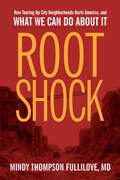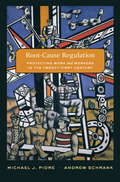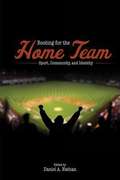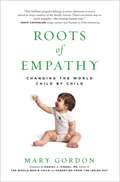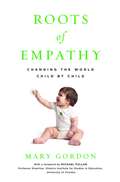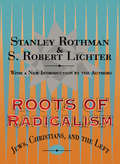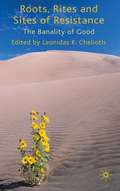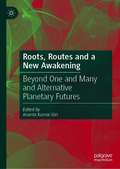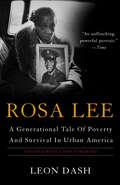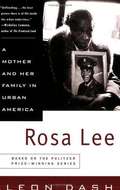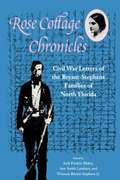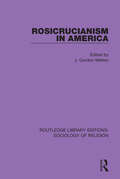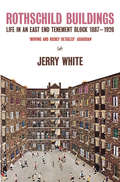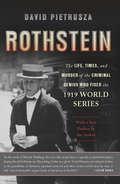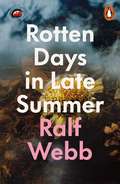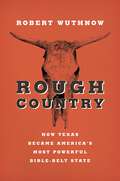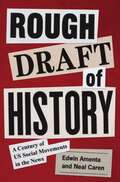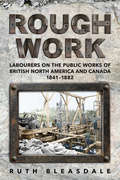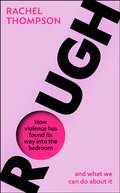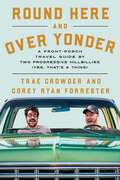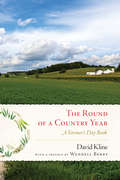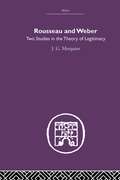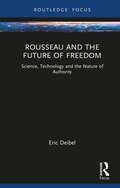- Table View
- List View
Root Shock: How Tearing Up City Neighborhoods Hurts America, And What We Can Do About It
by Mindy Thompson FulliloveRoot Shock examines 3 different U.S. cities to unmask the crippling results of decades-old disinvestment in communities of color and the urban renewal practices that ultimately destroyed these neighborhoods for the advantage of developers and the elite. Like a sequel to the prescient warnings of urbanist Jane Jacobs, Dr. Mindy Thompson Fullilove reveals the disturbing effects of decades of insensitive urban renewal projects on communities of color. For those whose homes and neighborhoods were bulldozed, the urban modernization projects that swept America starting in 1949 were nothing short of an assault. Vibrant city blocks - places rich in culture - were torn apart by freeways and other invasive development, devastating the lives of poor residents. Fullilove passionately describes the profound traumatic stress- the "root shock"that results when a neighborhood is demolished. She estimates that federal and state urban renewal programs, spearheaded by business and real estate interests, destroyed 1,600 African American districts in cities across the United States. But urban renewal didn't just disrupt black communities: it ruined their economic health and social cohesion, stripping displaced residents of their sense of place as well. It also left big gashes in the centers of cities that are only now slowly being repaired. Focusing on the Hill District of Pittsburgh, the Central Ward in Newark, and the small Virginia city of Roanoke, Dr. Fullilove argues powerfully against policies of displacement. Understanding the damage caused by root shock is crucial to coping with its human toll and helping cities become whole. Mindy Thompson Fullilove, MD, is a research psychiatrist at New York State Psychiatric Institute and professor of clinical psychiatry and public health at Columbia University. She is the author of five books, including Urban Alchemy.
Root-Cause Regulation: Protecting Work and Workers in the Twenty-First Century
by Michael J. PioreWork is now more deadly than war, killing approximately 2.3 million people a year worldwide. The United States, with its complex regulatory system, has one of the highest rates of occupational fatality in the developed world, and deteriorating working conditions more generally. Why, after a century of reform, are U.S. workers growing less safe and secure? Comparing U.S. regulatory practices to their European and Latin American counterparts, Root-Cause Regulation provides insight into the causes of this downward trend and ways to reverse it, offering lessons for rich and poor countries alike. The United States assigns responsibility for wages and hours, collective bargaining, occupational safety, and the like to various regulatory agencies. In France, Spain, and their former colonies, a single agency regulates all firms. Drawing on history, sociology, and economics, Michael Piore and Andrew Schrank examine why these systems developed differently and how they have adapted to changing conditions over time. The U.S. model was designed for the inspection of mass production enterprises by inflexible specialists and is ill-suited to the decentralized and destabilized employment of today. In the Franco-Iberian system, by contrast, the holistic perspective of multitasking generalists illuminates the root causes of noncompliance—which often lie in outdated techniques and technologies—and offers flexibility to tailor enforcement to different firms and market conditions. The organization of regulatory agencies thus represents a powerful tool. Getting it right, the authors argue, makes regulation not the job-killer of neoliberal theory but a generative force for both workers and employers.
Rooting for the Home Team
by Daniel A. NathanRooting for the Home Team examines how various American communities create and maintain a sense of collective identity through sports. Looking at large cities such as Chicago, Baltimore, and Los Angeles as well as small rural towns, suburbs, and college towns, the contributors consider the idea that rooting for local athletes and home teams often symbolizes a community's preferred understanding of itself, and that doing so is an expression of connectedness, public pride and pleasure, and personal identity. Some of the wide-ranging essays point out that financial interests also play a significant role in encouraging fan bases, and modern media have made every seasonal sport into yearlong obsessions. Celebrities show up for big games, politicians throw out first pitches, and taxpayers pay plenty for new stadiums and arenas. The essays in Rooting for the Home Team cover a range of professional and amateur athletics, including teams in basketball, football, baseball, and even the phenomenon of no-glove softball. Contributors are Amy Bass, Susan Cahn, Mark Dyreson, Michael Ezra, Elliott J. Gorn, Christopher Lamberti, Allison Lauterbach, Catherine M. Lewis, Shelley Lucas, Daniel A. Nathan, Michael Oriard, Carlo Rotella, Jaime Schultz, Mike Tanier, David K. Wiggins, and David W. Zang.
Roots of Empathy: Changing The World Child By Child
by Mary GordonThe acclaimed program for fostering empathy and emotional literacy in children—with the goal of creating a more civil society, one child at a time Roots of Empathy—an evidence-based program developed in 1996 by longtime educator and social entrepreneur Mary Gordon—has already reached more than a million children in 14 countries, including Canada, the US, Japan, Australia, and the UK. Now, as The New York Times reports that “empathy lessons are spreading everywhere amid concerns over the pressure on students from high-stakes tests and a race to college that starts in kindergarten,” Mary Gordon explains the value of and how best to nurture empathy and social and emotional literacy in all children—and thereby reduce aggression, antisocial behavior, and bullying.
Roots of Empathy: Changing the World, Child by Child
by Mary Gordon Michael FullanRoots of Empathy — an evidence-based program developed in 1996 by longtime educator and social entrepreneur Mary Gordon — has already reached more than 270,000 children in Canada, the U.S., Japan, Australia, New Zealand, and elsewhere. Now, as The New York Times reports that "empathy lessons are spreading everywhere amid concerns over the pressure on students from high-stakes tests and a race to college that starts in kindergarten", Mary Gordon explains the value of and how best to nurture empathy and social and emotional literacy in all children — and thereby reduce aggression, antisocial behavior, and bullying.
Roots of Radicalism: Jews, Christians, And The New Left
by Stanley RothmanWhen Roots of Radicalism first appeared. Nathan Glazer noted "this is a major work on the relationship between radical politics and psychological development." He went on to predict "no one will be able to write about the left and radicalism without taking it into account." Now finally available in a paperback edition, with a new introduction, the reader can evaluate just how prescient the authors are in their review of the student radical movement. Replete with interviews of radical activists, their provocative book paints a disturbing picture.The book raises critical questions about much previous social science research and ultimately about the reason an entire generation of Americans was so infatuated with the radical mystique. Robert A. Nisbet called the book "an extraordinarily skilled fusion of historical and psychological approaches to one of the most explosive decades in American social history." Robert E. Lane added "it will be prudent to read Rothman and Lichter along with our well worn copies of Keniston and Fromm." Writing in Political Psychology, Dan E. Thomas argued "the [book] is arguably the most important and definitely the most provocative book in the field of personality and politics to have appeared in the past several years." Recently, in Forbes. Peter Brimelow referred to Roots of Radicalism as "Rothman's main achievement as a political scientist...his definitive study of the 1960s New Left."In the new introduction, the authors review the initial reception of Roots of Radicalism and its subsequent treatment. They also review the major literature on the causes, course, and consequences of the student movement of the 1960s which has appeared since the publication of the book. Finally, they update their own analysis.
Roots, Rites and Sites of Resistance
by Leonidas K. CheliotisWhich practices count as resistance? Why, where, and how does resistance emerge? When is resistance effective, and when is it truly progressive? In addressing these questions, this book brings together novel theoretical and empirical perspectives from a diverse range of disciplinary and geographical locales.
Roots, Routes and a New Awakening: Beyond One and Many and Alternative Planetary Futures
by Ananta Kumar GiriThis book seeks to find creative and transformative relationship among roots and routes and create a new dynamics of awakening so that we can overcome the problems of closed and xenopbhobic roots and rootless cosmopolitanism. The book draws upon multiple philosophical and spiritual traditions of the world such as Siva Tantra, Buddhist phenomenology and Peircean Semiotics and discusses the works of Ibn-Arabi, Thoreau, Tolstoy, Gandhi and Raimon Panikkar,among others.The book is transdiscipinary building on creative thinking from philosophy, anthropology, political studies and literature. It is a unique contribution for forging a new relationship between roots and routes in our contemporary fragile and complex world.
Rosa Lee: A Generational Tale Of Poverty And Survival In Urban America
by Leon DashBased on a heart-rending and much discussed series in the Washington Post, this is the story of one woman and her family living in the projects in Washington, D. C. A transcendent piece of writing, it won the Pulitzer Prize and the Robert F. Kennedy Journalism Award. For four years Leon Dash of the Washington Post followed the lives of Rosa Lee Cunningham, her children, and five of her grandchildren, in an effort to understand the persistence of poverty and pathology within America’s black underclass. Rosa Lee’s life story spans a half century of hardship in the slums and housing projects of Southeast Washington, a stone’s throw from the marble halls and civic monuments of the world’s most prosperous nation. Yet for all of America’s efforts, Rosa Lee and millions like her remain trapped in a cycle of poverty characterized by illiteracy, teenage pregnancy, drugs, and violent crime. Dash brings us into her life and the lives of her family members offering a human drama that statistics can only refer to. He also shows how some people--including two of Rosa Lee’s children--have made it out of the ghetto, breaking the cycle to lead stable middle-class lives in the mainstream of American society.
Rosa Lee: A Mother And Her Family In Urban America
by Leon DashBased on a series of Pulitzer Prize-winning articles, this harrowing account of life in the urban underclass offers compelling testimony in the ongoing national debate about welfare reform. In Rosa Lee, Washington Post reporter Leon Dash vividly chronicles the hardships and pathologies of the daily life of a family in the slums of Washington, D. C. Defying simplistic conservative and liberal arguments about why the black underclass persists, Dash puts a human face on their struggle to survive despite both disastrous personal choices and almost insurmountable circumstances. The book spans a half-century of hardship, from Rosa Lee Cunningham's bleak early life in the Jim Crow South to her death from AIDS at age fifty-nine. Rosa Lee gave birth to her first child at fourteen, was married at sixteen, and ultimately bore eight children whom she had no legitimate means of supporting. When her welfare checks proved insufficient to feed her family, she turned to prostitution and selling stolen clothes and drugs. Yet Rosa Lee maintained a flickering desire to do what was right. Two of her sons did escape the ghetto to enter mainstream life, and after Dash's series of articles ran in The Washington Post, she made public speeches, hoping to encourage other people to avoid her destructive choices. Rosa Lee is the worthy successor to such works as Jonathan Kozol's Death at an Early Age. It offers no easy answers, but is instead challenging, thought-provoking, and utterly unforgettable.
Rose Cottage Chronicles: Civil War Letters of the Bryant-Stephens Families of North Florida
by Arch Frederic Blakey Ann Smith Lainhart Winston Bryant StephensThis is a collection of letters and diary entries from the correspondence and papers of the Bryant-Stevens family of north Florida during the civil war. These letters and diaries provide a unique glimpse into the lives of the people of north Florida during this turbulent time.
Rosicrucianism in America (Routledge Library Editions: Sociology of Religion #14)
by J. Gordon MeltonThe material in this book, first published in 1990, provides important documentation for the first generation of Rosicrucianism in North America, especially the still vigorous Rosicrucian Fraternity. These chapters reprinted here are so necessary to the understanding of this most occult organization, and are otherwise difficult to locate and read.
Rothschild Buildings: Life in an East-End Tenement Block 1887 - 1920
by Jerry WhiteWinner of the Jewish Chronicle Harold H. Wingate Literary Award.Rothschild Buildings were typical of the 'model dwellings for the working classes' which were such an important part of the response to late-Victorian London's housing problem. They were built for poor but respectable Jewish immigrants from Eastern Europe, and the community which put down roots there was to be characteristic of the East End Jewish working class in its formative years. By talking to people who grew up in the Buildings in the 1890s and after, and using untapped documentary evidence from a wide range of public and private sources, the author re-creates the richly detailed life of that community and its relations with the economy and culture around it. The book shows how cramped and austere housing was made into homes; how the mechanism of class domination, of which the Buildings were part, was both accepted and fought against; how a close community was riven with constantly shifting tensions; and how that community co-existed in surprising ways with the East End casual poor of 'outcast London'. It provides unique and fascinating insights into immigrant and working-class life at the turn of the last century.
Rothschild's Introduction to Sociology: An adaptation of OpenStax's Introduction to Sociology
by Teal RothschildIntroduction to Sociology 2e, an OpenStax resource created with several goals in mind: accessibility, affordability, customization, and student engagement--all while encouraging learners toward high levels of learning. Instructors and students alike will find that this textbook offers a strong foundation in sociology.
Rothstein: The Life, Times, and Murder of the Criminal Genius Who Fixed the 1919 World Series
by David PietruszaHistory remembers Arnold Rothstein as the man who fixed the 1919 World Series, an underworld genius. The real-life model for The Great Gatsby's Meyer Wolfsheim and Nathan Detroit from Guys and Dolls, Rothstein was much more--and less--than a fixer of baseball games. He was everything that made 1920s Manhattan roar. Featuring Jazz Age Broadway with its thugs, speakeasies, showgirls, political movers and shakers, and stars of the Golden Age of Sports, this is a biography of the man who dominated an age. Arnold Rothstein was a loan shark, pool shark, bookmaker, thief, fence of stolen property, political fixer, Wall Street swindler, labor racketeer, rumrunner, and mastermind of the modern drug trade. Among his monikers were "The Big Bankroll," "The Brain," and "The Man Uptown. " This vivid account of Rothstein's life is also the story of con artists, crooked cops, politicians, gang lords, newsmen, speakeasy owners, gamblers and the like. Finally unraveling the mystery of Rothstein's November 1928 murder in a Times Square hotel room, David Pietrusza has cemented The Big Bankroll's place among the most influential and fascinating legendary American criminals.
Rotten Days in Late Summer
by Ralf WebbA TELEGRAPH AND IRISH TIMES BOOK OF THE YEARLONGLISTED FOR THE POLARI FIRST BOOK PRIZE SHORTLISTED FOR THE FORWARD PRIZE FOR BEST FIRST COLLECTIONSHORTLISTED FOR THE JOHN POLLARD FOUNDATION INTERNATIONAL POETRY PRIZE 'Impressive . . . tender, unflinching' Guardian'This is poetry in the grand tradition of annihiliation by desire. It's what the young are always learning, and the old, if they are wise, never forget' Anne Boyer, author of The Undying'Brilliant . . . heralds the arrival of a frank and vital poetic voice' Sharlene Teo, author of Ponti'Frank and alert . . . an important voice in British poetry' Eley Williams, author of The Liar's Dictionary'Direct and heart-breaking' Alex Dimitrov, author of Love and Other Poems'A rare thing . . . razor-sharp' Julia Copus, author of This Rare Spirit: A Life of Charlotte MewIn Rotten Days in Late Summer, Ralf Webb turns poetry to an examination of the textures of class, youth, adulthood and death in the working communities of the West Country, from mobile home parks, boyish factory workers and saleswomen kept on the road for days at a time, to the yearnings of young love and the complexities of masculinity.Alongside individual poems, three sequences predominate: a series of 'Love Stories', charting a course through the dreams, lies and salt-baked limbs of multiple relationships; 'Diagnostics', which tells the story of the death from cancer of the poet's father; and 'Treetops', a virtuosic long poem weaving together grief and mental health struggles in an attempt to come to terms with the overwhelming data of a life.The world of these poems is close, dangerous, lustrous and difficult: a world in which whole existences are lived in the spin of almost-inescapable fates. In searching for the light within it, this prodigious debut collection announces the arrival of a major new voice in British poetry.
Rough Country: How Texas Became America's Most Powerful Bible-Belt State
by Robert WuthnowHow the history of Texas illuminates America's post–Civil War pastTracing the intersection of religion, race, and power in Texas from Reconstruction through the rise of the Religious Right and the failed presidential bid of Governor Rick Perry, Rough Country illuminates American history since the Civil War in new ways, demonstrating that Texas's story is also America’s. In particular, Robert Wuthnow shows how distinctions between "us" and “them” are perpetuated and why they are so often shaped by religion and politics.Early settlers called Texas a rough country. Surviving there necessitated defining evil, fighting it, and building institutions in the hope of advancing civilization. Religion played a decisive role. Today, more evangelical Protestants live in Texas than in any other state. They have influenced every presidential election for fifty years, mobilized powerful efforts against abortion and same-sex marriage, and been a driving force in the Tea Party movement. And religion has always been complicated by race and ethnicity.Drawing from memoirs, newspapers, oral history, voting records, and surveys, Rough Country tells the stories of ordinary men and women who struggled with the conditions they faced, conformed to the customs they knew, and on occasion emerged as powerful national leaders. We see the lasting imprint of slavery, public executions, Jim Crow segregation, and resentment against the federal government. We also observe courageous efforts to care for the sick, combat lynching, provide for the poor, welcome new immigrants, and uphold liberty of conscience.A monumental and magisterial history, Rough Country is as much about the rest of America as it is about Texas.
Rough Draft of History: A Century of US Social Movements in the News (Princeton Studies in American Politics: Historical, International, and Comparative Perspectives #199)
by Edwin Amenta Neal CarenA comprehensive account of the media's coverage of social movements in the United StatesA new view of twentieth-century US social movements, Rough Draft of History examines how national newspapers covered social movements and the organizations driving them. Edwin Amenta and Neal Caren identify hundreds of movement organizations, from the Women’s Christian Temperance Union to Occupy Wall Street, and document their treatment in the news. In doing so, Amenta and Caren provide an alternative account of US history from below, as it was refracted through journalistic lenses.Iconic organizations in the women’s rights, African American civil rights, and environmental movements gained substantial media attention. But so too did now-forgotten groups, such as the German-American Alliance, Committee to Defend America by Aiding the Allies, and Peace and Freedom Party. Amenta and Caren show why some organizations made big news while others did not, why some were treated well while others were handled roughly. They recover forgotten stories, including that of the Townsend Plan, a Depression-era organization that helped establish Social Security. They also reveal that the media handled the civil rights movement far more harshly than popular histories recount. And they detail the difficulties movements face in today’s brave new media world.Drawing from digitized newspapers across a century and through to the present, Rough Draft of History offers insights for those seeking social and political change and those trying to make sense of it.
Rough Work: Labourers on the Public Works of British North America and Canada, 1841–1882 (Canadian Social History Series)
by Ruth BleasdaleThe labourers at the heart of this study built the canals and railways undertaken as public works by the colonial governments of British North America and the federal government of Canada between 1841 and 1882. Ruth Bleasdale’s fascinating journey into the little-known lives of these labourers and their families reveals how capital, labour and the state came together to build the transportation infrastructure that linked colonies and united an emerging nation. Combining census and community records, government documents, and newspaper archives Bleasdale elucidates the ways in which successive governments and branches of the state intervened between labour and capital and in labourers’ lives. Case studies capture the remarkable diversity across regions and time in a labour force drawn from local and international labour markets. The stories here illuminate the ways in which men and women experienced the emergence of industrial capitalism and the complex ties which bound them to local and transnational communities. Rough Work is an accessibly written yet rigorous study of the galvanization of a major segment of Canada’s labour force over four decades of social and economic transformation.
Rough: How violence has found its way into the bedroom and what we can do about it
by Rachel Thompson**AS HEARD ON BBC RADIO 4'S WOMEN'S HOUR**Rough is a revolutionary non-fiction work exploring the narratives of sexual violence that we don't talk about.A bad sexual experience.A grey area. Not rape but... A violation .These are the terms we use to describe the experiences we don't have words for. The way we talk about topics such as sex, consent, assault aren't fit for purpose.Through powerful testimony from 50 women and non-binary people, this book shines a light on the sexual violence that takes place in our bedrooms and beyond, sometimes at the hands of people we know, trust, or even love. Rough investigates violations such as 'stealthing,' non-consensual choking, and non-consensual rough sex acts that our culture is only starting to recognise as sexual violence.The book explores the ways in which systems of oppression manifest in our sexual culture - from racist microaggressions, to fatphobic acts of aggression, and ableist dehumanising behaviour. An intersectional, sex-positive, kink-positive work, the book also examines how white supremacy, transphobia, biphobia, homophobia, and misogyny are driving forces behind sexual violence.Rough is an urgent, timely call for change to the systems that oppress us all.'An incredible investigation into a frighteningly common part of our sexual experience,' Dr Fern Riddell'Rough speaks to how many women often feel after sexual encounters ...This book is excellent and demonstrates just how valid those feelings are,' Adele Walton, founder of Humanitarian Hotgirl
Round Here and Over Yonder: A Front Porch Travel Guide by Two Progressive Hillbillies (Yes, that’s a thing.)
by Trae Crowder Corey Ryan ForresterJoin Southern comedian duo Trae Crowder and Corey Ryan Forrester in this hilarious and irreverent travel guide as they wander about ponderin' the peculiarities beyond their small-town front porches.Trae and Corey will take you from the smallest of small towns to major US metropolises (or is it metropoli? We haven't a fartin' clue!). They'll even cross the pond to sip tea in some of them fancy kings-and-castles places that PBS Viewers Like You can't stop yapping about. From Chickamauga to Cheyenne, New York to New Orleans, Seattle to Scotland—no matter where these two wandering jesters go, there's something to roast, something to toast, and something to learn about what ties us together as humans. Even the most outrageous of us.In this book you'll find:Loads of eccentric things folks say.Seriously well-informed tips on exactly where to eat and what to order in each city.Anecdotes from Corey about everything from "German Mardi Gras" in Helen, Georgia, to eatin' over-priced rabbit in Napa, California.Travel bingo boards and ad-libs for your own adventures.And as many off-the-beaten-path jokes as can be packed into 256 pages!Perfect for anyone who:Likes to travel.Loathes to travel.Any Southerner who's both a little proud and a little ashamed of the South (that's all the sane ones).Any Northerner, Midwesterner, or West Coaster who wants to know what two self-proclaimed rednecks have to say about their own hometown.Anyone from the UK who thinks us Yanks are the craziest folks on God's green earth (cause this book will likely confirm that stereotype, yup).
Round of a Country Year: A Farmer's Day Book
by David KlineDavid Kline has been called a "twentieth–century Henry David Thoreau" by his friends and contemporaries; an apt comparison given the quiet exuberance with which he records the quotidian goings–on on his organic family farm. Under David's attentive gaze and in his clear, insightful prose the reader is enveloped in the rhythms of farm life; not only the planting and harvesting of crops throughout the year, but the migration patterns of birds, the health and virility of honeybees left nearly to their own devices, the songs and silences of frogs and toads, the disappearance and resurgence of praying mantises in fields–turned woodlands, the search for monarch butterflies in the milkweed. There's rhythm in community, too—neighbors gathering to plant potatoes or to maintain an elderly friend's tomato garden, organic farming conferences and meetings around family dining tables or university panels.Interspersed with local lore (when the spring's first bumblebee appears the children can go barefoot) is deep technical knowledge of cultivation and land management and the hazards of modern agri–business. Kline records statewide meetings of district supervisors, knows which speakers and committee chairmen are in the pockets of the oil and gas lobbyists, stands up and says his part.At a time when America's population is being turned toward the benefits of small, local farming practices on our health and our environment, Kline's daybook offers a striking example of the ways in which we are connected to our environment, and the pleasure we can take in daily work and stewardship.
Rousseau and Weber
by J.G. MerguiorJean-Jacques Rousseau and Max Weber, central thinkers to the discussion of political legitimacy, represent two very different stages and forms of social theory: early modern political philosophy and classical sociology. In these studies, Dr Merquior describes and assesses their individual contributions to the understanding of the concept of political legitimacy. Dr Merquior compares Rousseau and Weber to a handful of other major theorists and highlights the contemporary prospects of the alternatives between democratic participation and bureaucratizm. This book was first published in 1980.
Rousseau and the Future of Freedom: Science, Technology and the Nature of Authority (Routledge Studies in Science, Technology and Society)
by Eric DeibelThis book examines Rousseau’s conception of freedom and its significance for our modern technological world. Drawing on Rousseau’s thought to explore the changing nature of authority, science and technology in modern society, the book’s approach points to how Rousseau had a tragic conception of freedom, one that parallels the circumstances that characterize our own desire for freedom and democracy. Rousseau’s critique of progress is integral to his thought in general and underrated when it comes to our own studies of science, technology and society. This volume refers to cases from the world of "free software" to consider our own predicament with how a flood of code and algorithms that is being wrapped around everything from our stuff to our food, to our bodies, our brains and – by extension – our freedom. As such, it will appeal to scholars of social and political theory, philosophy and ethics, particularly those with interests in science and technology studies and the implications of modern technology for freedom.
Rousseau's Critique of Inequality
by Frederick NeuhouserRousseau's Discourse on the Origin of Inequality among Mankind, published in 1755, is a vastly influential study of the foundations of human society, including the economic inequalities it tends to create. To date, however, there has been little philosophical analysis of the Discourse in the literature. In this book, Frederick Neuhouser offers a rich and incisive philosophical examination of the work. He clarifies Rousseau's arguments as to why social inequalities are so prevalent in human society and why they pose fundamental dangers to human well-being, including unhappiness, loss of freedom, immorality, conflict, and alienation. He also reconstructs Rousseau's four criteria for assessing when inequalities are or are not legitimate, and why. His reconstruction and evaluation of Rousseau's arguments are accessible to both scholars and students, and will be of interest to a broad range of readers including philosophers, political theorists, cultural historians, sociologists, and economists.
